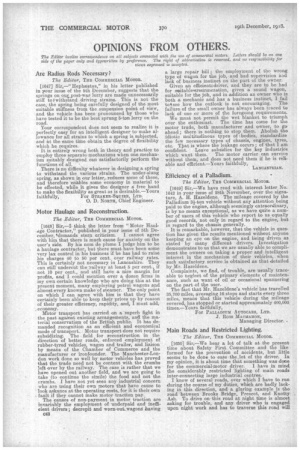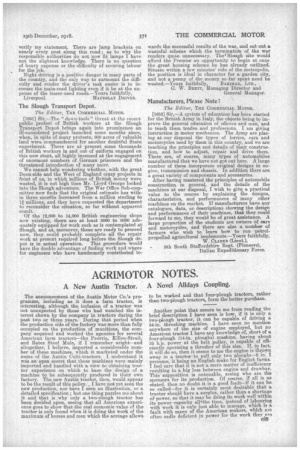OPINIONS FROM OTHERS.
Page 18

Page 19

If you've noticed an error in this article please click here to report it so we can fix it.
The Editor invites correspondence on all subjects connected with the use of commercral motors. Letters should be on one side of the paper only and typewritten by preference. The right of abbreviation is reserved, and no resrMsibility for views expressed is accepted.
Are Radius Rods Necessary ?
The Editor, THE COMMERCIAL MOTOR.
[1647] Sir,—"Ilepha3stus," in his letter published in your issue of the 5th December, suggests that the springs on outpost,-war lorry are made unnecessarily stiff tolwithstand driving strains. This is not the case, the spring being carefully designed of the most suitable stiffness from the suspension point of view, and the vehicle has been pronounced 'by those who have tested it to be the best sprung 5-ten lorry on the road.
Your correspondent does not seem to realize it is perfectly easy for an intelligent designer to make allowance for all strains to which a spring is subjected, and at the same time obtain the degree of flexibility which he requires. It is entirely wrong both in theory and practice to empiny three separate mechanisms when one mechanism suitably designed can satisfactorily perform the functions of all.
There is no difficulty whatever in designing a spring to withstand the various strains. The under-slung spring, as shown in our letter, reduces aome of these, and therefore enables some economy in material to be effected, while it gives the designer a free hand to make the flexibility as great as is desirable.—Yours
faithfully, For STRAKER-SQUIEE, LTD. 0. D. NORTH, Chief Engineer.
Motor Haulage and Reconstruction.
The Editor, THE COMMERCIAL MOTOR.
[1648] Sin—Ithink the letter (mm "Motor Haulage Contractor," published in your issue of 5th December, 'demands stern criticism. I cannot agree with him that there is much cause for anxiety on the user's side. By his nom de plume I judge him to be a haulage contractor1 but there must have been some very lax control in his business if he has had to raise his charges 40 to 50 per cent, over railway rates. This is certainly not necessary in Lancashire. They can still undercut the 'railway at least 5 per cent., if not 10 per cent., and still have a nice margin for profits, and I could mention over a, dozen firms in my own certain knowledge who are doing this at the present moment, many employing petrol wagons and almost every known make of steamer. The only point on which I can agree with him is that they have certainly been able to keep their prices up by reason of their greater efficiency, rapidity, and, I must add, economy.
rotor transport has carried on a superb fight in the past against existing arrangements, anti the material conservatism of the British public. It has demanded recognition as an efficient and economical mode of transport. Motor transport does not require subsidizing. The field for reconstruction in the direction of better roads, enforced employment of rubber-tyred vehicles, wagon and trailer, and liaison by means of the Chamber of Commerce and the manufacturer or ironfounder. The Manchester-London work done so well by motor vehicles has proved that the trade need not be content with the crumbs left over by the railway. The case is rather that we have opened out another field, and we are going to take (to continue the simile) the food and not the crumbs. I have not yet seen any industrial concern who are using their own motors that have cause to look askance at the operating costs, for it is their own fault if they cannot make motor traction pay.
The causes of non-payment in motor, traction are invariably the employment of underpaid and inefficient drivers; decrepit and worn-outawagonli having
c42 a large repair bill ; the employment of the wrong type of wagon for the job, • and bad supervision and lack of business instinct on the part of the owner.
Given an efficientt driver, and they are to be had for snitableeremuneration, given a sound wagon, suitable for the job, and in addition an owner who is both a mechanic and has a business instinct, I fail to4see how the outlook is not encouraging. The failure. of the small owner has always been traced to lack of one or more of the foregoing requirements.
We must not permit the wet blanket to triumph over the enthusiast. The time has come for the motor trade, both manufacturer and owner, to go ahead ; there is nothing to stop them. Abolish the idiotic multitudinous types of .; bodies, standardize the few necessary types of chassis, engines, tyres, etc. That is where the leakage occurs ; of that I am confident. 'Leave subsidies for the key industries which want them. The motor carrier can survive without them, and does not need them if he is reliable and efficient.—Yours faithfully,
LANCASTRIAN.
Efficiency of a Palladium.
The Editor, THE COMMERCIAL MOTOR.
[1648] Sir,—We have read with interest letter No. 1642 in your issue of 28th November, over the signature, A. H. Hazeldene. The mileage covered by the Palladium 3i-ton vehicle without any attention being paid to the engine, although seemingly extraordinary, is by no means exceptional, as we have quite a number of users of this vehicle who report to us equally good records, not only in regard to the engine, but in regard to the chassis generally.
It is remarkable, however, that the vehicle in question has given the results mentioned without anyone keeping an eye on the engine, and being driven as stated by many different drivers. Investigation demonstrates to us that we are usually able to compliment the owners on taking a proper and intelligent interest in the mechanism of their vehicles, when such satisfactory service is obtained as that detailed by Mr. Hazeldene. Complaints, we find, of trouble, are usually traceable to neglect of the primary elements of maintenance, such as want of oil or occasional spa.nnering on the part of the user.
The fact that Mr. Hazeldene's vehicle has travelled 35,700 miles, averaging 16 stops and starts every three miles, means that this vehicle during the mileage covered, has stopped or started approximately 400,000 times.—Yours faithfully, For PALLADIUM AUTOCARS, LTD.
Managing Director.
Main Roads and Restricted Lighting.
The Editor, THE COMMERCIAL MOTOR.
[1650] Sir,—We hear a lot of talk at the present time about Safety First Committee and the like formed for the prevention of accidents, but little seems to be done to ease the ,lot of the driver. In my opinion, it is about time that something was done for the commercial-motor driver. I have in mind the considerably restricted 'lighting of main roads inter-connecting large industrial centres.
I know of several roads, over which I have to run during the course of my duties, which are badly lacking in this direction, and a glaring example is the road between Brooks Bridge, Prescot, and Knotty Ash. To drive on-this road at night time is almost asking for trouble, and any driver who is engaged upon nijaht work and has to traverse this road will verify my statement. There are lamp brackets on nearly every post along this road ; as to why the responsible authorities do not now fit lamps I have not the slightest knowledge. There is no 'question of heavy expense or the difficulty of securing labour for the job.
Night driving is a positive danger in many parts of the country, and the only way to surmount the difficulty andrender the driver's task easier is to increase the main-road lighting even if it be at the expense of the lesser-used roads—Yours faithfully,
Liverpool. MADDSLAY DRIVER.
The Slough Transport Depot.
The Editor, THE COMMERCIAL MOTOR.
[1651] Sir,—The " down-tools " threat at the recent public protest of British workers at the Slough Transport Depot brings again into prominence an ill-considered project launched some months since, when, in spite of many protests, 600 acres of valuable land were commandeered for another doubtful State experiment. There are at present some thousands of British workers in and out of uniform engaged on this new stunt, all highly incensed at the engagement of enormous numbers of German prisoners and the threatened introduction of many more. We cannot help wondering whether, with the great Doon-side and the West of England crazy projects in. front of mil in which millions of British money were wasted, it is not high time Mr. Lloyd George looked into the Slough adventure. The War Office Sub-committee now finds that the original estimate has within three months increased from a million sterling to 11 millions, and they have requested the department to reconsider the situation, so far without apparent result.
Of the 12,000 to 14,000 British engineering shops now existing, there are at least 5000 to 6000 adequately equipped for work such as is contemplated at Slough, and as, moreover, these are ready to proceed now, they could probably. complete all the repair work at present required long before the Slough depot is in actual operation. This procedure would have the double advantage of finding work and wages for engineers who have handsomely contributed to wards the successful results of the war, and cut out a wasteful scheme which the terminatiOn of the war renders quite unnecessary. The *Slough site would afford the Premier an opportunity to begin at once the great housing scheme he has already outlined. Situate within a few minutes' ride of the metropolis, the position is ideal in character for a garden city, and not a penny of the money. so .far spent need be wasted.—Yours faithfully, BAR1MAR, LTD., C. W. BRETT, Managing Director and.
General Manager.
Manufacturers, Please Note !
The Editor, THE COMMERCIAL MOTOR.
[1652] Sir,—A system of education fiat been started for the British Army in Italy, the objects being to improve the general education of officers and men; and to teach them trades and professions. I am giving instruction in motor mechanics. The Army are placing at our disposal the types of lorries, cars and motorcycles used by them in this country, and we are teaching the principles and details of their construction, and how to adjust, repair and drive them. There are, of course' many types of automobiles manufactured that we have not got out here. A large number of these incorporate original designs in engine, transmission and chassis. In addition there are a great variety of components and accessories.
After having mastered the principles of automobile construction in general, and the details of the machines at our disposal, I wish to give a practical value to the course by explaining the designs, characteristics, and performances of many other machines on the market. If manufacturers have any catalogues, data, or descriptions showing the design and performances of their machines, that they could forward to me, they would be of great assistance. A large proportion of the students are owners of cars and motorcycles, and there are ahso a number of farmers who wish to learn how to run petrolpropelled agricultural implements.—Yours faithfully,
W. CLARICE (Lieut.),
9th South Staffordshire Regt. (Pioneers), Italian Expeditionary Force.






















